Related Research Articles

The treatment of women by the Taliban refers to actions and policies by two distinct Taliban regimes in Afghanistan which are either specific or highly commented upon, mostly due to discrimination, since they first took control in 1996. During their first rule of Afghanistan, the Taliban were notorious internationally for their misogyny and violence against women. In 1996, women were mandated to wear the burqa at all times in public. In a systematic segregation sometimes referred to as gender apartheid, women were not allowed to work, nor were they allowed to be educated after the age of eight. Women seeking an education were forced to attend underground schools, where they and their teachers risked execution if caught. They were not allowed to be treated by male doctors unless accompanied by a male chaperone, which led to illnesses remaining untreated. They faced public flogging and execution for violations of the Taliban's laws.
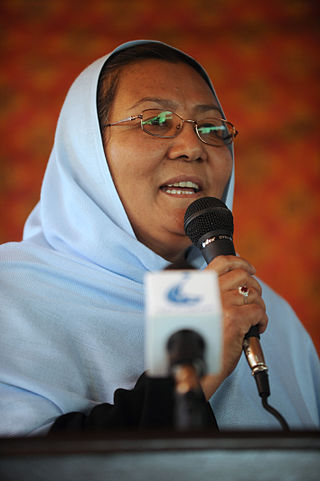
Dr. Habiba Sarābi is a hematologist, politician, and reformer of the reconstruction of Afghanistan after the Taliban first took power. In 2005, she was appointed Governor of Bamyan Province - the first Afghan woman to become a provincial governor. She had served as Afghanistan's Minister of Women's Affairs and as Minister of Culture and Education. Sarabi was instrumental in promoting women's rights and representation and environmental issues. She belongs to the ethnic Hazara people of Afghanistan. Her last name is sometimes spelled Sarobi.
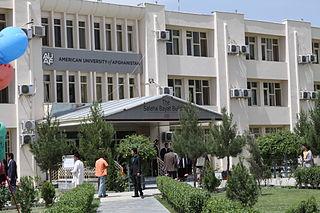
Education in Afghanistan includes K–12 and higher education, which is under the Ministry of Education and Ministry of Higher Education. In 2021, there were nearly 10 million students and 220,000 teachers in Afghanistan. The nation still requires more schools and teachers. Soon after the Taliban take took the country in August 2021, they banned girls from secondary education. Some provinces still allow secondary education for girls despite the ban. In December 2022, the Taliban government also prohibited university education for females in Afghanistan, sparking protests and international condemnation. In December 2023, investigations were being held by the United Nations into the claim that Afghan girls of all ages were allowed to study at religious schools. As of November 2024, some parts of the country allow women to attend religious schools to pursue dentistry, nursing, and other subjects.
Human rights in Afghanistan under the Taliban regime are severely restricted and considered among the worst in the world. Women's rights and freedom are severely restricted, as they are banned from most public spaces and employment. Afghanistan is the only country in the world to ban education for women over the age of eleven. Taliban's policies towards women are usually termed as gender apartheid. Minority groups such as Hazaras face persecution and eviction from their lands. Authorities have used physical violence, raids, arbitrary arrests and detention, torture, enforced disappearances of activists and political opponents.

Christina Lamb OBE is a British journalist and author. She is the chief foreign correspondent of The Sunday Times.

Women's rights in Afghanistan are severely restricted by the Taliban. In 2023, the United Nations termed Afghanistan as the world's most repressive country for women. Since the US troops withdrawal from Afghanistan in 2021, the Taliban gradually imposed restrictions on women's freedom of movement, education, and employment. Women are banned from studying in secondary schools and universities, making Afghanistan the only country to prohibit females from studying beyond the sixth grade. Women are not allowed in parks, gyms, or beauty salons. They are forbidden from going outside for a walk or exercise, from speaking or showing any part of their face or body outside the home, or even from singing or reading from within their own homes if they could be heard by strangers outside. In extreme cases, women have reportedly been subjected to gang-rape and torture in Taliban prisons.

Malala Yousafzai is a Pakistani female education activist, film and television producer, and the 2014 Nobel Peace Prize laureate at the age of 17. She is the youngest Nobel Prize laureate in history, the second Pakistani and the only Pashtun to receive a Nobel Prize. Yousafzai is a human rights advocate for the education of women and children in her native homeland, Swat, where the Pakistani Taliban had at times banned girls from attending school. Her advocacy has grown into an international movement, and according to former Prime Minister Shahid Khaqan Abbasi, she has become Pakistan's "most prominent citizen."

Penelope (Penny) Andrews is a South African and American legal scholar.
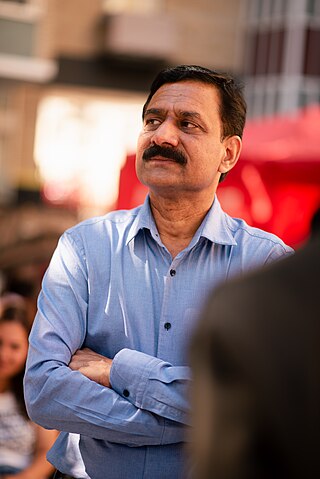
Ziauddin Yousafzai is a Pakistani educational entrepreneur and activist best known as the father of Nobel laureate Malala Yousafzai, who protested against the Tehrik-i-Taliban Pakistan opposition to the education rights of girls, especially for Pakistani girls.
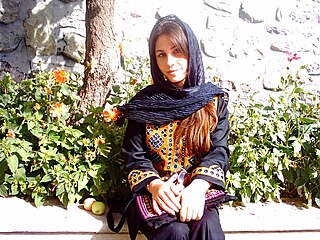
Homeira Qaderi born in 1980 is an Afghan writer, advocate for women's rights, and professor of Persian literature, currently serving as a Robert G. James Scholar Fellow at Radcliffe Institute of Advanced Research, Harvard University.
Malala Fund is an international, non-profit organization that advocates for girls' education. It was co-founded by Malala Yousafzai, the Pakistani activist for female education and the youngest Nobel Prize laureate, and her father, Ziauddin. The stated goal of the organization is to ensure 12 years of free, safe and quality education for every girl. As of July 2020, the organization has 48 staff and supports 58 advocates working across Afghanistan, Brazil, Ethiopia, India, Lebanon, Nigeria, Pakistan and Turkey.

Roya Rahmani is an Afghan diplomat who served as Afghanistan's first female ambassador to the United States and non-resident ambassador to Mexico, Argentina, Colombia, and the Dominican Republic from December 2018 to July 2021. She is currently the Chair of the international advisory company in development finance — Delphos International LTD. She is also a distinguished fellow at the Georgetown Institute for Women, Peace, and Security, a senior advisor at the Atlantic Council's South Asia Center, and a senior fellow for international security at the New America Foundation. From 2016 to 2018, she served as Afghanistan's first female ambassador to Indonesia, first ever ambassador to the Association of Southeast Asian Nations, and non-resident ambassador to Singapore.
Protests in Afghanistan held by Islamic democrats and feminists against the treatment of women by the Taliban began on 17 August 2021, following the fall of Kabul. Supported by the National Resistance Front of Afghanistan, the protesters also demanded decentralization, multiculturalism, social justice, labor, education, and food. Pro-Taliban counterprotests also took place.
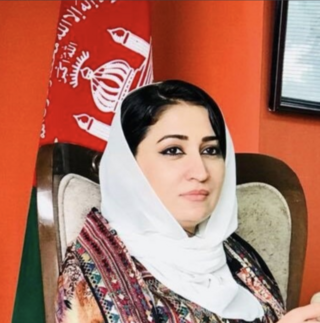
Mursal Nabizada was an Afghan politician, women's rights activist, lawmaker and critic of the Taliban who served as a Member of the House of the People from Kabul. Nabizada was killed in Kabul in January 2023 by the Taliban.
Tamana Zaryab Paryani is an Afghan journalist and women's rights activist known for her protests against Taliban rule in Afghanistan. She is widely recognised as a symbol of the women's struggle in Afghanistan. In December 2022, Tamana was named as one of BBC's 100 Women. She is a member of an Afghan women's rights activist group Seekers of Justice. She fled Afghanistan in August 2022 and now lives in Germany.

#StopHazaraGenocide is a social media campaign that aims to raise awareness and demand action against the persecution and violence faced by the Hazara ethnic group. The campaign was initiated by Hazaras in response to a series of deadly attacks on the Hazara community, especially students and women, by the Taliban and other extremist groups.
Wahida Amiri is an Afghan librarian and women's rights activist. She was featured in the BBC 100 Women 2021 for her continued efforts protesting against the Taliban and their ban on women's education and right to work.
Bread and Roses is a 2023 American documentary film about women in Afghanistan and the role of the Taliban. It was directed and produced by Sahra Mani. It was co-produced by Jennifer Lawrence and Justine Ciarrocchi for their company Excellent Cadaver after Lawrence saw news coverage of the 2021 Taliban offensive as U.S. troops withdrew. The documentary features footage from Sharifa, an ex-government employee forced indoors, Zahra, a woman organizing activists in her dentistry practice, and Taranom, who seeks refuge in Pakistan. It debuted at the 2023 Cannes Film Festival to critical acclaim and released in select theaters and on Apple TV+ on November 22, 2024.
Dorothy Estrada-Tanck is a Mexican academic who has worked in Spain. She has led the United Nations Working Group on discrimination against women and girls. She co-authored a report about the "gender apartheid" in Afghanistan which they considered a crime against humanity.
Nila Ibrahimi is an ethnic Hazara teen activist from Afghanistan who advocates for the rights of Afghan girls and women.
References
- 1 2 3 4 Times, Zan (2023-08-15). "Our departure from Afghanistan doesn't end our struggle: Nayera Kohistani". Zan Times. Retrieved 2024-06-27.
- ↑ KabulNow (2024-01-23). "Women's Movement: Drawing Intellectual Power from Lived Experiences". KabulNow. Retrieved 2024-06-27.
- ↑ "Femena Stands in Solidarity with Brave Women of Afghanistan Demanding Justice and Accountability - Femena, Rights Peace Inclusion". 2023-09-13. Retrieved 2024-06-27.
- ↑ "Experts: Taliban treatment of women may be "gender apartheid"". OHCHR story. July 2023.
- ↑ "Malala Fund works to end gender apartheid in Afghanistan | Malala Fund". malala.org. 2024-03-06. Retrieved 2024-06-27.
- ↑ "Opinion | The Taliban's oppression of women is apartheid. Let's call it that". Washington Post. 2024-04-01. ISSN 0190-8286 . Retrieved 2024-06-28.
- ↑ "Nobel Peace Laureate, Malala Yousafzai, Speaks at IPI on Gender Apartheid". International Peace Institute. 2024-03-08. Retrieved 2024-06-26.
- ↑ M.A, Fahtma (2024-03-09). "Nayera Kohistani Powerful Testimony: A Glimpse into the Harrowing Reality of Afghan Women". Kauser News Agency. Retrieved 2024-06-27.